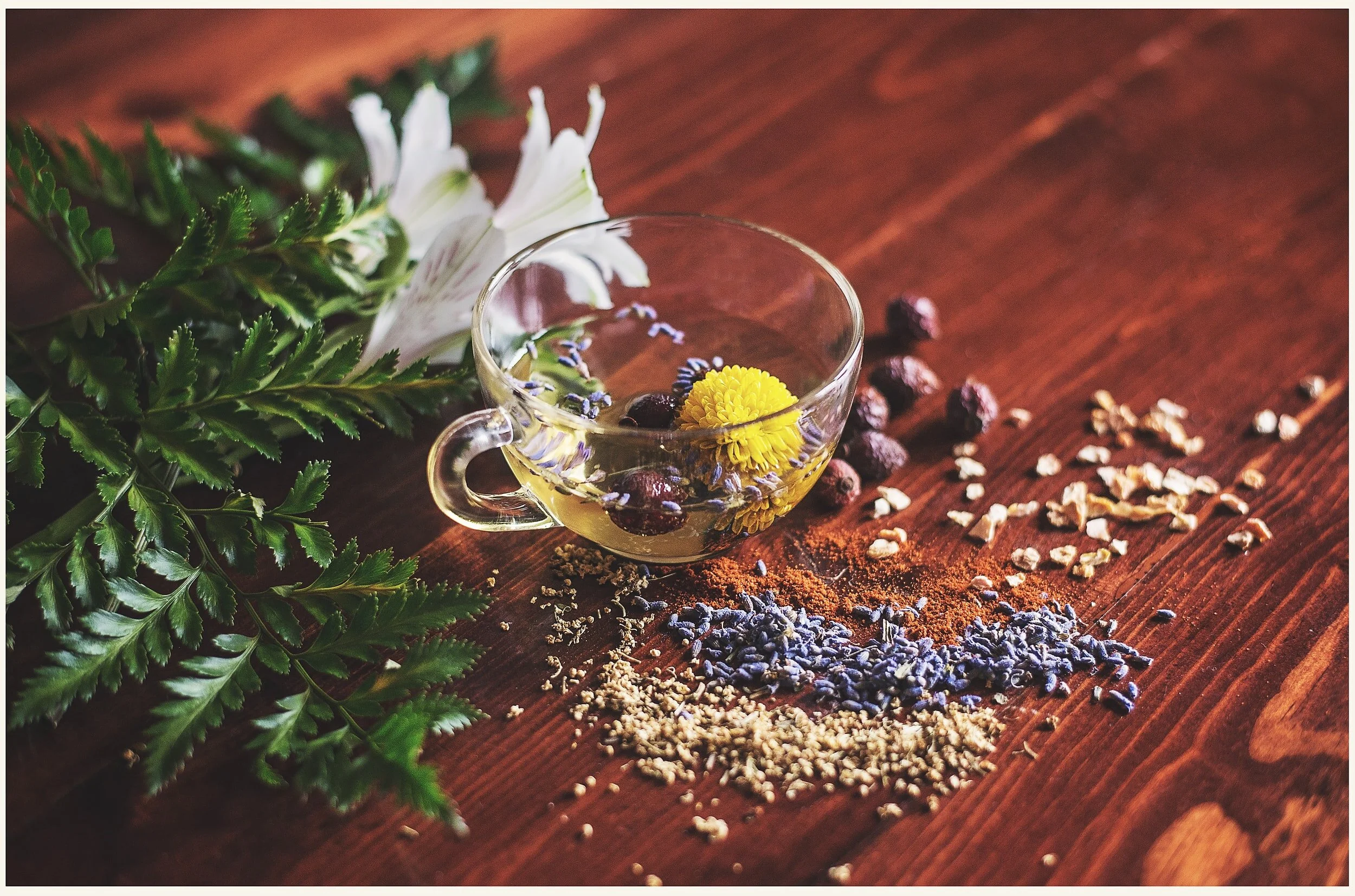ADAPTOGENS: To deal with stress?
“Adaptogens have been studied throughout history as a way to improve the body’s ability to respond to stress, increase energy and attention and fight off fatigue.”
A family of natural chemicals known as "adaptogens" has grown in prominence due to its exceptional capacity to boost general wellbeing and foster resilience in the face of stress.
In this article, we explore the wide range of adaptogens and examine their many uses, side effects, and considerations. How adaptogens function, their significance for stress management and fostering balance in regulating hormones. Learn the characteristics of three adaptogenic vegetables, and the advantages of these foods for anxiety and sleep. We also go through significant factors including possible side effects, pharmaceutical interactions, and their impacts on particular medical conditions. Finally, we discuss how adaptogens and nootropics differ from one another in order to fully comprehend each of their distinct functions.
What are adaptogens?
Stress has progressively become a given in today's fast-paced society. Stress can harm our emotional and physical health, including immune system function, cardiovascular health, and mental health, from work pressures to personal obligations. Nevertheless, there is a natural remedy available in the form of adaptogens that can support inner harmony and wellness: Adaptogens are a select group of herbs (and some mushrooms) that support the body’s natural ability to deal with stress.
There are a wide variety of adaptogens available, each with special advantages and consequences. Although adaptogenic herbs are well recognised, adaptogenic veggies should also be researched. Here are three veggies that are adaptogenic, along with information about them and their effects:
Ashwagandha: Ayurvedic medicine has used the potent adaptogenic root ashwagandha for ages. It encourages stress reduction, maintains a strong immune system, and might improve cognitive performance. Ashwagandha is well known for its capacity to increase energy while fostering a sense of serenity.
Rhodiola: High-altitude areas are where Rhodiola Rosea, sometimes referred to as Arctic root or golden root, thrives. This adaptogenic herb enhances mental clarity, fights fatigue, and could improve physical performance. The ability of Rhodiola Rosea to elevate mood and lessen anxiety is well known.
Tulsi: Often known as holy basil, is a highly regarded adaptogenic herb in Ayurvedic medicine. It provides a wide range of advantages, including as antioxidant capabilities, immunological support, and stress reduction. Holy basil is thought to improve emotional stability and stress resistance.
Siberian ginseng: This herb isn’t actually ginseng, but it works in similar ways. One study found that it may help ward off fatigue, depression, and stress.
Artic root: This is sometimes referred to as “rose root” and grows in cold climates in Asia and Europe. It’s a historical herb that’s been used in Russia and Scandinavia to treat minor health ailments like headaches and flu, helping people bounce back more quickly and feel more energised after illnesses. Artic root was found to also boost activity and productivity when used alongside antidepressants while having no serious documented side effects.
Schisandra: The Soviet Union published military studies about a stimulant called Schisandra chinensis, it was found that those berries and seeds eaten by Nanai hunters reduced their thirst, hunger, exhaustion and even improved their ability to see at night. Schisandra was found to be most helpful when used in people who had overall exhaustion and low physical/ mental performance. It’s also been found to be especially helpful with certain neurological disorders, mental disorders like schizophrenia. One of the unique properties of schisandra is that, unlike other stimulants like caffeine, the body doesn’t become tolerant to it quickly, so it can be used in the same doses effectively. This herb is most useful for promoting liver health and stabilising blood sugars as well as acting as an adaptogen.
They are called adaptogens because of their unique ability to “adapt” their function according to the specific needs of the body. While adaptogens have been around for years in many Asian cultures (specifically Chinese and Indian), the term was coined by the Soviet Union’s Ministry of Health in 1947 — to describe a substance that offers support for the body’s natural resistance to adverse influences like stress. Adaptogens have the potential to help indirectly with other health issues, like pain, digestive concerns, insomnia, and more.
How adaptogens work?
A class of chemicals and plants known as "adaptogens" can aid the body in adjusting to stress.
They have been employed for many years in conventional medicine to enhance general health. Natural compounds that are non-toxic to the body and trigger a generalised response that boosts stress tolerance are known as adaptogens. Scientist Nikolai Lazarev from Russia was the first to recognise and investigate them in the 1940s.
Why taking adaptogens?
When we can adapt to stress, we perform and feel better despite what is stressing us out.
When you’re stressed, your adrenal gland releases the stress hormone cortisol, which then energises you to tackle an emergency but too much too often is usually bad for our bodies. “Stress sets off a cascade of physical responses that affect immune function, our hormones, our cognitive function system, and our internal clock, called our circadian rhythm,” Korn says. “If these stressors persist, this leads to chronic illness.” Adaptogens work by “hacking” the stress response in the body. With that we can also improve our health and well-being :These herbs aid our bodies in reacting to or recovering from both short- and long-term physical or mental stress.
Adaptogenic herbs list
Adaptogenic herbs are said to help your body cope with physical/ emotional stress while boosting mental clarity for people with many health conditions. There are dozens of plants, growing in some of the world’s harshest environments, that fall under the adaptogen category however there are three main adaptogenic herbs have been studied and found to be both safe and nontoxic:
Herbs that are adaptogenic have distinct advantages and come from various origins. Siberian ginseng, Arctic root, and Schisandra are three adaptogenic herbs that have undergone extensive research. It has been demonstrated that Siberian ginseng enhances cognition and lessens weariness. Arctic root elevates mood and lessen signs of stress while schisandra enhances liver function and lowers inflammation. These adaptogenic herbs have been extensively researched for their potential health benefits and have been used for millennia in traditional medicine.
Are adaptogenic herbs beneficial to your health?
Adaptogenic herbs act in non-specific ways to increase resistance to stress, without disturbing normal biological functions, explains celebrity doctor and alternative medicine champion Andrew Weil.
For example The reishi mushroom is famous for its modulating properties on the immune system. If you have a hyperactive immune system, that can translate into allergies. Reishi brings this hyperreactivity to a regular, neutral state, making it a wonderful ally during allergy season.” Adaptogens help maintain our immune system, nervous system, and hormonal system by bringing us back to homeostasis, aka balance.
One study found that adaptogens really can be used to promote health for general well-being and when used as a supplement with other traditional medications for specific conditions and health problems. They’ve been shown to help people with cardiovascular health and certain neurological disorders.
The available studies suggest that adaptogens really are helpful in decreasing symptoms of fatigue and exhaustion and may be most helpful when used alongside other therapies for people with chronic and acute medical conditions. So, while your doctor may not encourage you to take an adaptogen every day for no reason, it may be helpful if you experience low energy as a result of a chronic medical condition.
Choosing the Right Adaptogen and Hormone Balancing:
One of the prominent impacts of adaptogens is their capacity to regulate hormones. Even though each adaptogen has its own special qualities, Ashwagandha, Rhodiola Rosea, and Maca are some of the more well-liked choices for hormone balancing. The best adaptogen to choose, nevertheless, will depend on a person's needs, health, and objectives. The best adaptogen for your unique hormonal requirements can be determined with the help of a healthcare practitioner or herbalist.
Adaptogens for Sleep and Anxiety:
A number of adaptogens have the potential to help with anxiety reduction and restful sleep. There are two notable examples:
-The usage of valerian root as a natural sleep aid dates back many years. It might ease anxiety-related symptoms, enhance sleep quality, and quiet the mind.
-Passionflower is frequently used as a homoeopathic treatment for sleeplessness and anxiety. The nervous system is calmed by it, which encourages relaxation and aids in sleep.
Those who have hypothyroidism should use caution when using adaptogens as some adaptogenic herbs may interfere with thyroid medicines. Before including adaptogens in a hypothyroidism treatment plan, it is essential to speak with a healthcare provider with expertise in thyroid health.
Nootropics vs. Adaptogens:
While both adaptogens and nootropics improve cognition and general wellbeing, their modes of action are different. While nootropics primarily aim to improve cognitive function and brain performance, adaptogens concentrate on supporting the body's response to stress and encouraging balance. Depending on personal objectives and demands, both adaptogens and nootropics have distinct advantages.
How to use adaptogens?
Adaptogens should not be considered as a ‘miracle cure’, experts caution.
They should be considered as part of a whole-body treatment that includes a proper diet, regular exercise and adequate sleep. Also, while there are some health benefits to adaptogens, the Food and Drug Administration (FDA) doesn’t monitor the quality or purity of herbs and supplements like over-the-counter products; Talk with your doctor before taking adaptogens.
There are many possibilities for boosting general health, hormone balance, sleep, and anxiety in the rich and varied realm of adaptogens. Adaptogens offer a natural and holistic approach to resilience and stress management, from adaptogenic foods to classic herbs. However, while introducing adaptogens into your regimen, it is imperative to take into account unique needs, potential interactions, and particular health issues. On your path to wellness, embrace the power of adaptogens, seek the advice of experts, and learn how these incredible natural companions may change your life.
Despite the fact that adaptogens are generally regarded as safe, it is vital to use caution and think about potential interactions. Antidepressants, among other drugs, may not be compatible with some adaptogens. Before using adaptogens with prescription medications, it is best to speak with a healthcare provider. Adaptogens should not be taken as the only way to lose weight or to lower cortisol levels. They are not a replacement for expert medical counsel.




